Have you ever wondered how to enhance your wallaby’s living space? Providing an enriching environment for your wallaby is crucial for its well-being and overall health. In this article, we will explore some simple yet effective ways to enhance your wallaby’s habitat and ensure it has a happy and fulfilled life. From creating engaging play areas to incorporating diverse natural elements, we will guide you on how to create an environment that your wallaby will truly thrive in. Let’s dive in and discover how you can enrich your wallaby’s world!
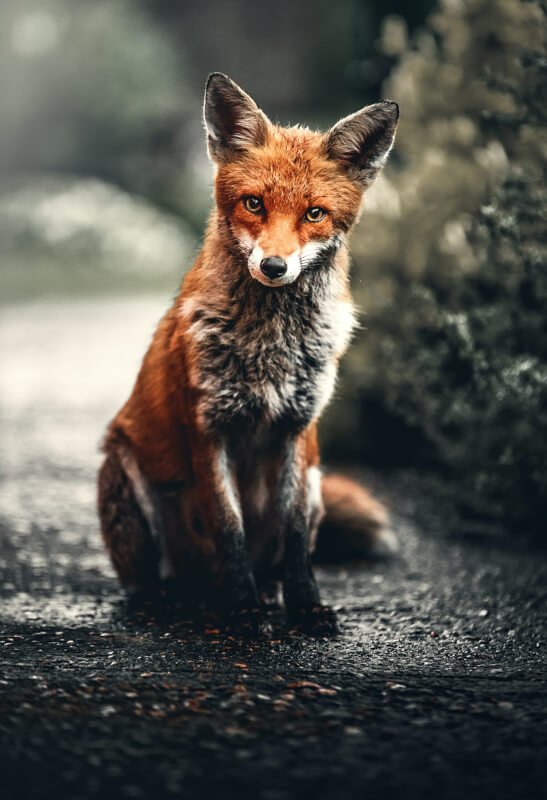
Creating a Safe and Secure Enclosure for Your Wallaby
Choose an appropriate enclosure size
When creating an enclosure for your wallaby, it is crucial to select a size that allows for ample space to roam and explore. Wallabies are naturally active animals, and providing them with enough room to move around is essential for their physical and mental well-being. Ensure that the enclosure is large enough for the wallaby to hop and jump freely.
Ready for Cat Trivia?
Test your knowledge about cats!

Ensure the enclosure is escape-proof
Wallabies are known for their agility and their ability to jump long distances. To keep your wallaby safe, it is essential to make sure the enclosure is escape-proof. This means ensuring that the walls are high enough to prevent the wallaby from jumping over them. Additionally, make sure there are no gaps or weak points in the fencing that the wallaby could exploit to make an escape.
Provide a shelter for your wallaby
Creating a sheltered area within the enclosure is vital to protect your wallaby from adverse weather conditions such as excessive heat, rain, or wind. This can be a simple structure like a small hut or a covered space with walls and a roof. Ensure that the shelter is well-insulated, well-ventilated, and provides adequate protection from the elements.
Create a comfortable resting area
In addition to providing a sheltered space, it is important to create a comfortable resting area for your wallaby. This could be in the form of soft bedding or a cozy hideout where the wallaby can retreat to when it wants to rest or sleep. Including natural materials like hay or straw can create a more inviting and comfortable environment for your wallaby to relax in.
Offering Varied Vegetation for Foraging and Grazing
Provide a diverse range of native plants
One way to enrich your wallaby’s environment is by offering a varied selection of native plants within its enclosure. Wallabies are natural foragers, and having a diverse range of vegetation allows them to engage in natural behaviors while providing nutrition. Research the native plants in your region that are safe for wallabies to consume and introduce them to the enclosure.
Introduce edible grasses and shrubs
In addition to native plants, you can further enhance your wallaby’s foraging experience by introducing edible grasses and shrubs. Consider planting a mix of grasses and shrubs that are safe for your wallaby to eat. This will not only provide a natural food source but also add visual interest and stimulate their natural grazing behaviors.
Rotate vegetation to prevent overgrazing
To ensure the sustainability of the vegetation within the enclosure, it is important to rotate the plants periodically. Overgrazing can deplete the resources and lead to an imbalance in the ecosystem. By rotating the vegetation, you allow the plants to recover while offering fresh grazing options to your wallaby.
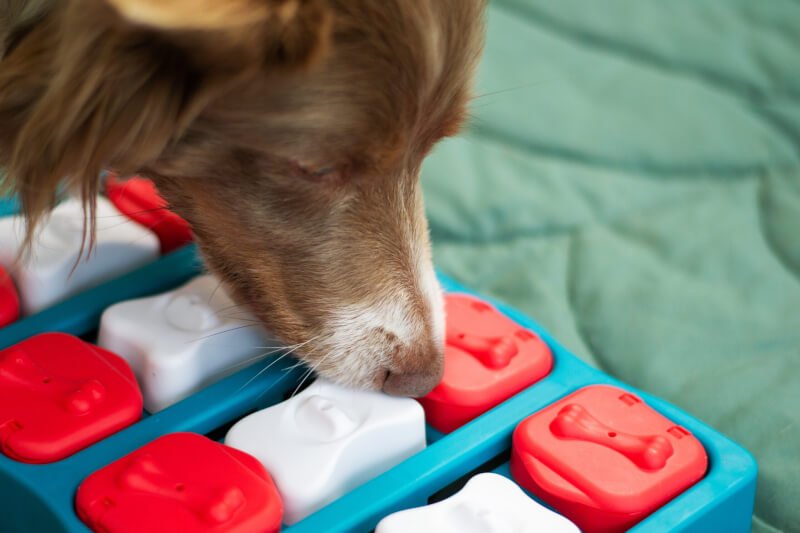
Simulating Natural Habitat with Artificial Landforms
Add rocks, logs, and stumps as climbing structures
Wallabies are skilled climbers and jumpers. Incorporating artificial landforms such as rocks, logs, and stumps into the enclosure can mimic their natural habitat and provide opportunities for climbing and exploration. These structures can also serve as vantage points for your wallaby to observe its surroundings.
Incorporate burrows or dens for hiding and nesting
Creating burrows or dens within the enclosure can provide your wallaby with a sense of security and enable them to exhibit natural behaviors like nesting and hiding. These spaces can be made using materials such as soil, wood, or even small tunnels or tubes for added complexity. Ensure that the burrows are spacious and well-ventilated.
Create elevated platforms for wallabies to observe their surroundings
Wallabies are naturally curious animals and enjoy observing their environment from higher vantage points. By incorporating elevated platforms or perches within the enclosure, you provide your wallaby with the opportunity to survey its surroundings and feel more connected to its environment. These platforms can be made from sturdy materials like wood or metal and should be placed strategically for optimal visibility.
Introducing Stimulation through Enrichment Activities
Offer puzzles and foraging toys
Enrichment activities such as puzzles and foraging toys can provide mental stimulation for your wallaby. Hide treats or food within these toys, encouraging your wallaby to use problem-solving skills to access the rewards. This not only keeps them mentally engaged but also mimics their natural foraging behaviors in the wild.
Provide opportunities for physical exercise
Physical exercise is important for your wallaby’s overall health and well-being. Provide structures like tunnels, ropes, or platforms that promote movement and encourage your wallaby to hop and explore. Regular physical activity helps to maintain muscle tone, prevent boredom, and reduce stress.
Rotate and vary enrichment items regularly
To prevent habituation and maintain your wallaby’s interest, it is crucial to rotate and vary the enrichment items regularly. Introduce new toys or modify existing ones to keep the environment stimulating and engaging. This ensures that your wallaby continues to benefit from enrichment activities and avoids becoming bored with its surroundings.
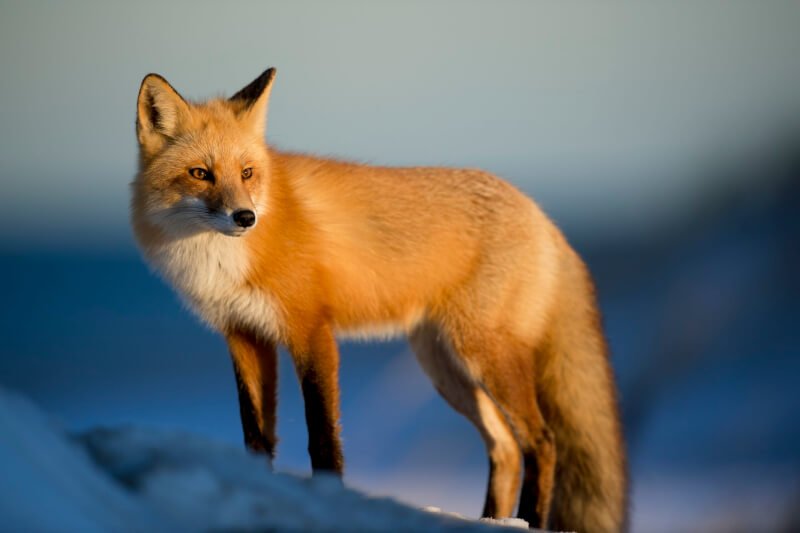
Promoting Mental Stimulation with Sensory Enrichment
Play nature sounds or calming music
Stimulate your wallaby’s sense of hearing by playing nature sounds or calming music within the enclosure. This can create a soothing and natural ambiance that mimics their natural habitat. Avoid loud or sudden noises that may startle or stress your wallaby.
Create different scent trails
Wallabies have a strong sense of smell, and creating different scent trails within the enclosure can provide mental stimulation. Use safe and non-toxic materials such as herbs or spices to create scent trails that lead to food sources or interactive toys. This engages their olfactory senses and encourages exploration.
Offer tactile stimuli through safe objects and textures
Providing objects with different textures and materials offers tactile stimulation for your wallaby. This can include items like soft blankets, natural grass mats, or branches with varying bark textures. Ensure that all objects are safe, non-toxic, and regularly inspected for wear and tear.
Encouraging Social Interaction and Group Dynamics
Consider keeping multiple wallabies together
Wallabies are social animals and thrive when they have companions. Consider keeping multiple wallabies together to allow for social interaction. Make sure to provide enough space and resources to prevent competition or aggression between individuals. If introducing new wallabies, monitor their interactions carefully to ensure compatibility.
Provide hiding spots for wallabies to alleviate stress
Creating hiding spots within the enclosure can help alleviate stress for your wallaby. Include structures such as small caves, dense vegetation, or boxes that provide a safe and secluded space. These hiding spots offer a sense of security and allow your wallaby to retreat if they feel overwhelmed or anxious.
Allow supervised interaction with compatible species
In addition to socializing with other wallabies, supervised interaction with compatible species can provide valuable socialization opportunities for your wallaby. This can include interactions with small, non-predatory animals or even supervised visits with calm and gentle dogs. Always prioritize the safety and well-being of all animals involved.
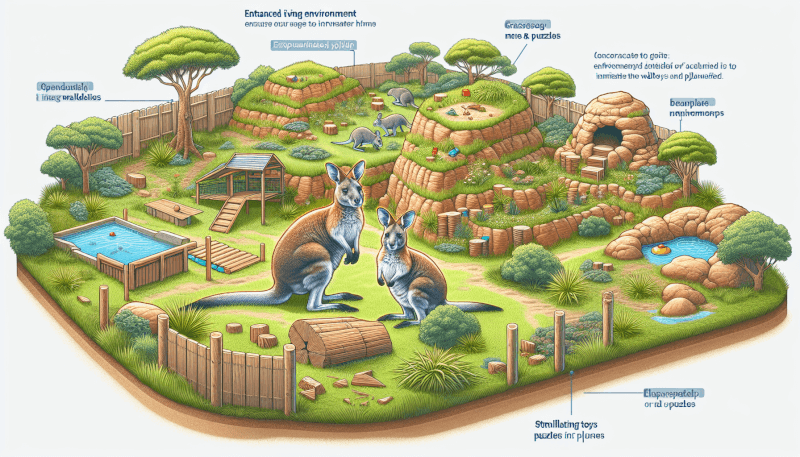
Implementing a Feeding Enrichment Program
Use food puzzles and treat-dispensing toys
Food puzzles and treat-dispensing toys are a great way to engage your wallaby’s natural foraging instincts. Fill these toys with their regular food or treats, encouraging them to work for their meals. This not only provides mental stimulation but also slows down eating and helps prevent boredom.
Offer browse or hay feeders
Introduce browse or hay feeders within the enclosure to provide a continuous source of food. These feeders simulate the natural grazing behaviors of wallabies and allow them to snack throughout the day. Make sure the browse or hay is fresh and of good quality to ensure optimal nutrition.
Consider introducing food foraging games
Food foraging games involve hiding small amounts of food in different locations within the enclosure, which your wallaby can then seek out and find. This encourages natural foraging behaviors and provides mental and physical stimulation. You can start with simple hiding spots and gradually increase the difficulty as your wallaby becomes more proficient.
Enhancing the Environment with Visual Stimulation
Incorporate mirrors to create an illusion of more wallabies
Wallabies are social animals and may enjoy the presence of others. Incorporating mirrors within the enclosure can create an illusion of additional wallabies, offering visual stimulation and potentially reducing feelings of loneliness. Ensure that the mirrors are securely installed and positioned to avoid any potential hazards.
Hang a variety of colorful toys and objects
Bright and colorful toys and objects can add visual interest to the wallaby’s environment. Hang toys, mobiles, or colorful balls securely within the enclosure to encourage play and exploration. Ensure that these objects are safe, non-toxic, and regularly inspected for any signs of damage.
Provide a viewing window or access to the outside world
Allowing your wallaby access to a viewing window or providing a meshed area where they can observe the outside world can provide visual enrichment. This allows them to see and interact with their surroundings, such as other animals, birds, or natural landscapes. Ensure that the window or meshed area is secure and provides adequate ventilation.
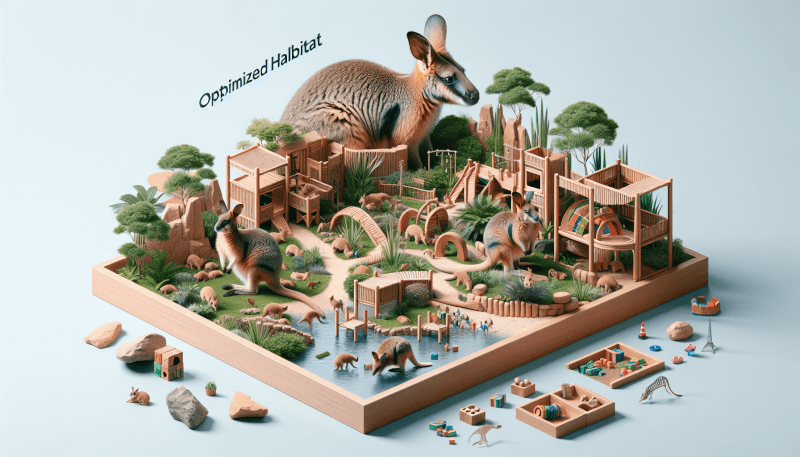
Maintaining a Clean and Hygienic Environment
Regularly clean and sanitize the enclosure
Maintaining a clean and hygienic enclosure is essential for your wallaby’s health. Regularly clean the enclosure, removing any debris, feces, or soiled bedding. Use safe cleaning products that do not contain harmful chemicals or residues that could be toxic to your wallaby.
Remove feces and soiled bedding promptly
Promptly removing feces and soiled bedding not only helps prevent the spread of bacteria and parasites but also keeps the enclosure smelling fresh. Regularly monitor the enclosure for any signs of soiling and dispose of waste in a proper manner.
Check for any potential hazards or toxic plants
Regularly inspect the enclosure and surrounding areas for any potential hazards or toxic plants. Remove any sharp objects, toxic substances, or plants that could be harmful if ingested. Wallabies have a natural curiosity and may explore their environment, so it is important to ensure their safety at all times.
Seeking Professional Guidance for Specific Enrichment Ideas
Consult a veterinarian or animal behaviorist
For more specific questions or concerns related to the enrichment of your wallaby’s environment, it is always best to consult with a veterinarian or animal behaviorist. They can provide expert advice tailored to your wallaby’s individual needs and help you create a comprehensive enrichment plan.
Join online communities or forums for wallaby owners
Connecting with other wallaby owners through online communities or forums can be a valuable resource for enrichment ideas and experiences. It allows you to learn from others who have firsthand knowledge and experience in providing enrichment for wallabies.
Participate in workshops or conferences on animal enrichment
Attending workshops or conferences on animal enrichment can provide you with in-depth knowledge and insights into the best practices for enriching your wallaby’s environment. These educational opportunities often feature expert speakers and hands-on activities that can enhance your understanding of animal enrichment techniques.
By following these comprehensive guidelines, you can create an enriching and stimulating environment for your wallaby, ensuring their overall well-being and happiness. Remember to always prioritize their safety and consult professionals or fellow wallaby owners when in doubt.


